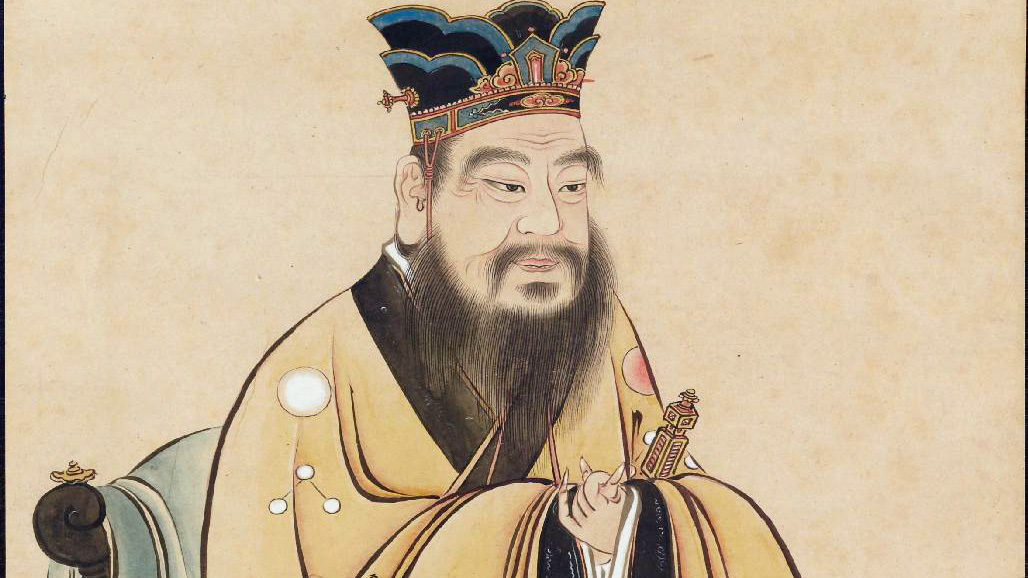K’ung-fu-tze—K’ung the Master, as his pupils called K’ung Ch’iu—was born at Ch’ufu, in the then kingdom of Lu and the present province of Shantung, in the year 551 B.C. His father was seventy years old when K’ung was born, and died when the boy was three. Confucius worked after school to help support his mother, and took on in childhood, perhaps, that aged gravity which was to mark nearly every step of his history.
At twenty-two he began his career as a teacher, using his home as a schoolhouse, and charging whatever modest fee his pupils could pay. Three subjects formed the substance of his curriculum: history, poetry, and the rules of propriety. Like Socrates he taught by word of mouth rather than by writing, and we know his views chiefly through the unreliable reports of his disciples. He gave to philosophers an example seldom heeded—to attack no other thinker, and waste no time in refutations.
He had at first only a few pupils, but soon the news went about that behind the lips of an ox and the mouth like a sea there was a kindly heart and a well-furnished mind, and in the end he could boast that three thousand young men had studied under him, and had passed from his home to important positions in the world. Some of the students—once as many as seventy—lived with him like Hindu novices with their guru; and they developed an affection that often spoke out in their remonstrances against his exposure of his person to danger, or of his good name to calumny.
He was an old-fashioned teacher, who believed that the maintenance of distance was indispensable to pedagogy. He was nothing if not formal, and the rules of etiquette and courtesy were his meat and drink. He tried to check and balance the natural epicureanism of the instincts with the puritanism and stoicism of his doctrine.
All in all he bore his greatness with modesty. “There were four things,” his disciples assure us, “from which the Master was entirely free. He had no foregone conclusions, no arbitrary predeterminations, no obstinacy, and no egoism.”
Confucius sought to implement his ideas in the government, but faced opposition from officials who were more interested in their own interests. Despite these challenges, Confucius continued to teach and write, and his ideas had a lasting impact on Chinese culture and ethics.
After decades of disappointments in government work, and 13 years of homeless wandering, in the sixty-ninth year of Confucius, Duke Gae succeeded to the throne of Lu, and sent three officers to the philosopher, bearing appropriate presents and an invitation to return to his native state. During the five years of life that remained to him Confucius lived in simplicity and honor, often consulted by the leaders of Lu, but wisely retiring to a literary seclusion, and devoting himself to the congenial work of editing the classics, and writing the history, of his people.
He consoled his solitude with poetry and philosophy, and rejoiced that his instincts now accorded with his reason. “At fifteen,” he said, “I had my mind bent on learning. At thirty I stood firm. At forty I was free from doubt. At fifty I knew the decrees of Heaven. At sixty my ear was an obedient organ for the reception of truth. At seventy I could follow what my heart desired without transgressing what was right.”
He died at the age of seventy-two. Early one morning he was heard singing a mournful song. He took to his couch, and after seven days he expired. His students buried him with pomp and ceremony befitting their affection for him; and building huts by his grave they lived there for three years, mourning for him as for a father. When all the others had gone Tsze-kung, who had loved him even beyond the rest, remained three years more, mourning alone by the Master’s tomb.
abridged from Durant, Will. Our Oriental Heritage: The Story of Civilization, Volume I (p.971-979). Simon & Schuster. Kindle Edition.
Stories
These anecdotes demonstrate the importance of Confucius’ teachings in his own life and how he practiced what he preached.
Filial Piety: One of Confucius’ most famous stories is about his devotion to his mother. According to the story, his mother was blind and had trouble finding her way around the house. So, Confucius moved his own sleeping quarters closer to hers and spent every night helping her to bed and taking care of her. This story is often cited as an example of Confucius’ commitment to the Confucian value of filial piety, or respect and care for one’s parents and elders.
Learning and Growth: Confucius was a lifelong learner and believed that education was the key to personal and social growth. According to one story, Confucius spent years studying the classics and practicing rituals in order to gain a deeper understanding of the past and to cultivate his own character. He also encouraged his students to pursue knowledge and self-improvement through reading, contemplation, and practice.
Humaneness: Confucius believed that all people had the potential for goodness and that it was our duty to cultivate that potential through acts of kindness and compassion. According to one story, Confucius once encountered a man who had stolen a sheep. Instead of punishing the man, Confucius talked to him and learned that he was stealing because he was hungry and had no other way to feed his family. Confucius then gave the man money and food, and told him to stop stealing and to find a better way to support his family. This story is often cited as an example of Confucius’ belief in the power of compassion to transform people’s lives.
